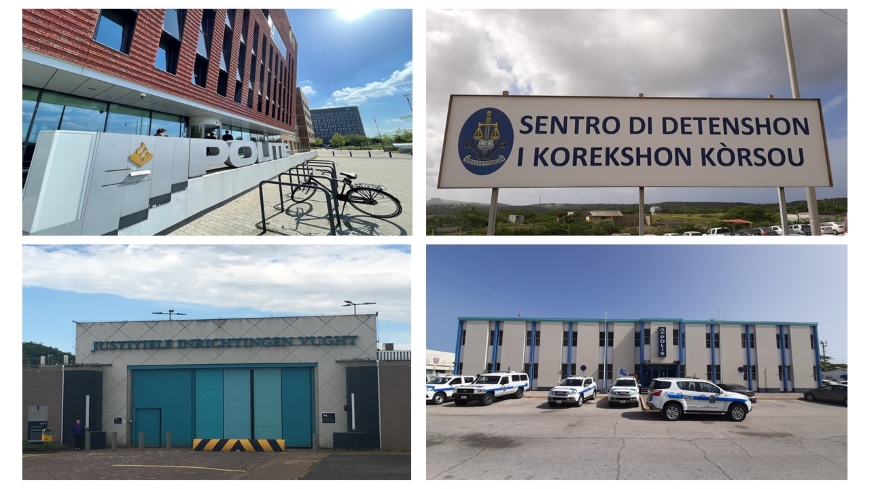During the visit, the delegation assessed the treatment and safeguards afforded to persons deprived of their liberty by the police and it examined the treatment and conditions of detention of persons in prison, including those held in high-security units. Several immigration detention facilities were also visited to examine the situation of persons deprived of their liberty under aliens legislation.
As regards the European part of the Kingdom, the CPT received no allegations of deliberate physical ill-treatment of persons deprived of their liberty by the police, in immigration detention centres and in prison establishments by staff. However, several persons complained about unduly tight handcuffing during their apprehension by the police, of excessive use of force by custodial staff at Rotterdam Immigration Detention Centre, and of verbal abuse, including discriminatory or racist language, by some members of staff at Rotterdam Detention Centre and Dordrecht and Vught Prisons.
The CPT reiterates that it is inappropriate to apply prison rules to persons held in immigration detention, given its administrative nature. At the same time, material conditions in the detention centres visited were very good. At the Closed Family Unit (GGV) at Zeist, families with children and women could benefit from a non-carceral and family-type living environment. The CPT nevertheless encourages the Dutch authorities to apply alternatives to immigration detention, especially for persons with vulnerabilities, such as victims of torture or trafficking, children, or families with young children. At Rotterdam Detention Centre, the Committee found low staffing levels and a poor regime of activities, and foreign nationals were often and routinely subjected to solitary confinement.
As regards prison establishments, specific attention was paid to the situation of persons on remand and those placed in the high-security units in Dordrecht, Vught and Zwolle Prisons. Material conditions were generally of a high standard. However, the conditions of detention in the old buildings at Vught Prison were poor, due to the presence of rodents and poor ventilation. The Committee found that persons held on remand continued to be confined to their cells for up to 21 hours a day. Moreover, the highly restrictive regimes and various security measures applied at the extra-security facility (EBI unit) and in some parts of the departments holding persons on terrorist offences (TA unit) and those posing management problems (BPG unit) at Vught Prison have been tightened further and appeared to be excessive. Efforts should be made to improve the regime and provide sufficient meaningful human contact to avoid conditions akin to solitary confinement, especially at the EBI unit. The CPT also examined the new policy framework for persons sentenced to life imprisonment and recommends that a judicial review mechanism be developed.
In Aruba, Curaçao and Sint Maarten, the CPT found that deliberate physical ill‑treatment of persons in police custody, in immigration detention and those held in prison was not a major issue. The Committee’s delegation only received a few isolated allegations of physical ill-treatment by staff in these establishments and some allegations of excessive use of force at the moment of apprehension, of excessively tight handcuffing and of verbal abuse.
While the CPT noted the refurbishments made in some of the police establishments, it nevertheless found that the material conditions in the facilities visited remained poor in general. This was particularly true for the police detention facility located at Curaçao Prison (SDKK) and of Shaba Police Station in Aruba. Moreover, the CPT once again found that detained persons were regularly held in these poor conditions for up to 10 days, and sometimes longer. The CPT reiterates its recommendation that persons should not be detained in these establishments in excess of approximately three days (that is, the initial period of police custody).
Material conditions at Simpson Bay Immigration Detention Facility in Sint Maarten were acceptable in several respects. However, material conditions offered to men at Dakota Immigration Detention Facility in Aruba, who were accommodated in shipping containers, and at the “Illegalen Barakken” Immigration Detention Facility in Curaçao were very poor.
Material conditions were on the whole acceptable at Point Blanche Prison in Sint Maarten, although signs of wear and tear were visible in many parts of the establishment. Despite some refurbishments, material conditions at Aruba Correctional Institution (KIA) and at the Centre for Detention and Correction Curaçao (SDKK) remained poor in general. The majority of prisoners were accommodated in dilapidated, dirty cells which were infested with vermin; sanitary annexes in multiple-occupancy cells were not fully partitioned and a number of them had black mould on the walls. Moreover, most cells at KIA held three prisoners in some 9.5 m2 and provided cramped conditions. The CPT formulates a series of recommendations to remedy these shortcomings.
As regards custodial staff, the situation remained problematic at KIA and SDKK, with low staffing levels, vacancies, frequent sick leaves and deployment of officers to other duties for various reasons. A new staffing table, which was expected to increase staffing levels, was being prepared for Point Blanche Prison and the CPT requested up-to-date information in this respect.
In their reply, the relevant authorities provide information on the measures taken or envisaged in response to the CPT's recommendations.
The CPT report and the response of the Dutch authorities have been made public at the request of the Government of the Kingdom of the Netherlands.
- Read the report (in English only)
- Read the executive summary: in English, in Dutch
- Read the response of the Dutch authorities (in English only)
- The CPT and the Netherlands



